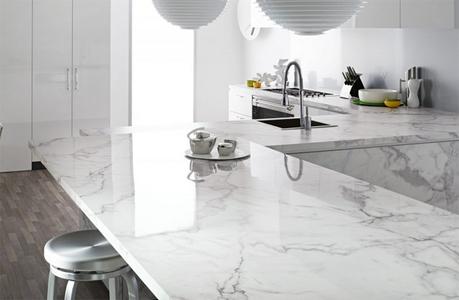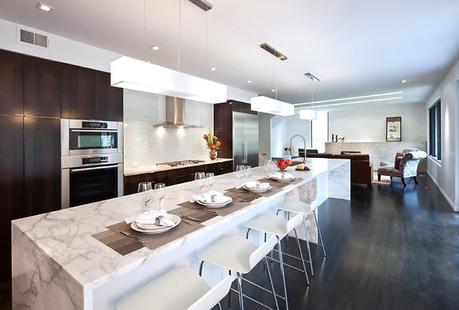Marble is an increasingly popular choice for kitchen worktops and its beauty and the sense of classic elegance it brings to the room is undeniable. However, there’s been much discussion about the practicality of using marble in the kitchen.
Before you make a firm decision on the worktop for your new kitchen design, consult an experienced kitchen design company and consider the pros and cons of using marble as a kitchen worktop surface.
What is marble?
According to the dictionary definition, marble is a hard crystalline metamorphic form of limestone, usually with coloured mottlings or streaks. This natural stone has been used for thousands of years in building and architecture, acquiring an enduring popularity that is unlikely to fade.
The whiter the marble, the purer the limestone from which it is formed, but of course not all marble is white. Choose from a vast selection that includes blacks and greys, yellows and browns, pinks and reds, blues and greens that all vary in density, porosity and mineral content. Compared to, say, granite, the patterns, hues and color available with marble are much softer and more elegant, which is the aesthetic many homeowners prefer.
Marble Pros
Attractive look and feel
Marble is generally considered to be the most beautiful of the accessible stones used for kitchen worktops. There’s a softness and elegance that other natural stones simply cannot compete with. Marble is unashamedly luxurious but in a refined ‘old money’ kind of way – there’s nothing vulgar about having marble in your kitchen. Since marble is a relatively soft stone, it will etch and antique with wear, developing its character and creating its own unique patina over the years – a bit like antique timber.
Put your hand on a marble worktop and you’ll find it surprisingly cool to the touch, on account of being a poor heat conductor due to its construction. It’s an important and alluring attribute of this material, especially during the summer months. Marble also has a soft feel – which may sound odd for a hard stone but it’s a sensory quality that adds to the mystique.
High performance material
Apart from the aesthetic aspect, marble has one major and unique strength: its temperature. Since it is formed from porous limestone, marble doesn’t conduct heat very well. This means the natural temperature of your marble kitchen worktop will be approximately 4 degrees cooler than the ambient temperature in the room.
The cool temperature is perfect for working with pastry – in fact many professional pastry chefs insist on having marble worktops or slabs in their kitchen. In both pastry and chocolate making, temperature control is critically important. Chefs work with their hands, but their body temperature can be higher than the ideal point for working with chocolate or pastry. Since marble absorbs the heat quicker than other surfaces, it helps cool chocolate quickly and keeps pastry cool.
Flexible price
Natural stone and marble prices can be sensitive to global markets, with prices able to fluctuate heavily depending on demand. While there’s no doubt that marble is a luxury material, it is widely accessible and products are available at many different price points to suit the budget.
If you’re considering marble for your kitchen worktops, it may not be as pricy as you think. Carrara marble, for instance, is a popular and commonly available brand with a reasonable price tag. With a bit of research, it is possible to source affordable marble worktops form less than £100 per meter.

Marble Cons
Prone to staining
Different types of marble vary in density, porosity and mineral content but they all have the same thing in common: open pores means marble will absorb liquids and is prone to staining. Wine (especially red wine), vinegar, tomato juice, lemon and other citrus fruit are the main offenders, and should be wiped off the surface immediately before the acidic liquids have a chance to attack the stone and cause discoloration.
There is no product available to stop this process, however if a professional sealant is applied, it can render the surface oil and water resistant, slowing down the rate of absorption and giving you more time to remove any spills before any damage can occur.
Easy to scratch
Being one of the softer natural stones, marble will scratch and wear over time, and it is vulnerable to cracks and chips. The surface will wear particularly in areas of heavy use, for instance standing at the sink. Edges may become duller while anything rubbing against the marble surface (belt buckles, jeans rivets etc) may cause further scratching. Sharp objects such as knives on the marble surface will also leave marks.
Whether you consider this kind of wear and tear a pro or a con depends on your personal taste. Many homeowners positively relish the ‘lived in’ feel and sense of history that marble can bring to a kitchen – the imperfections are part of the charm. However, if you expect a perfectly polished and gleaming surface, perhaps marble is not the worktop material of choice for you.
Can be expensive
Be under no illusion that marble can be eye wateringly expensive. Statuary marble such as Thassos (from the Greek island of Thassos) is pure unblemished white and has a striking translucency that resembles cast sugar. Calacatta Oro has a milky white background and features gold veining – another highly prized example that commands a high price.

While the price of marble depends on factors such as country of origin, thickness, hue, veins, design and other visual qualities, the stone itself is only one aspect of the kitchen worktop price. Finishing, transportation and fitting are additional factors that should be taken into account.
Cleaning your marble worktop
The best way to look after your marble kitchen worktop is to clean it regularly using warm soapy water and a soft cloth. Avoid using abrasive sponges that can scratch the surface. Once cleaned, buff the worktop dry with a soft cloth to avoid water marks. Proprietary cleaning kits for marble do exist but you can also use gentle commercial cleaning products with an alkaline base, not lemon scented soaps.
